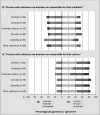A survey of international addiction researchers' views on implications of brain-based explanations of addiction and the responsibility of affected persons
- PMID: 38356788
- PMCID: PMC10863558
- DOI: 10.1177/14550725231188802
A survey of international addiction researchers' views on implications of brain-based explanations of addiction and the responsibility of affected persons
Abstract
Aim: To complement existing stakeholder surveys by exploring addiction researchers' views on the implications of brain-based explanations of addiction and the responsibilities of addicted persons. Methods: A total of 190 researchers from 29 countries (13.2%) participated in a LimeSurvey. Their perspectives on implications of brain-based explanations of addiction were explored qualitatively using open-ended questions. In addition, respondents could indicate their views on the responsibility of addicted individuals for their condition and actions using a Likert scale and a free-text field ("mixed methods light"). Qualitative analyses inductively identified the most frequent themes and deductively assessed the overall impact (positive, negative or both/ambivalent). Quantitative analyses included frequencies and proportions. Results: The major themes mentioned were medicalisation and the neglect of other factors, better treatment options and access, (reduced) stigma and (impaired) agency of affected persons. The overall evaluation yielded 46% positive, 33% negative and 16% ambivalent views. Approximately 60% of the participants considered addicted persons to be responsible for their condition and 80% for their actions. Conclusions: According to researchers, a brain-based approach to addictions has positive and negative implications. In particular, the neglect of factors other than biomedical seems to be of concern. Thus, a re-consideration of research priorities as well as affected individuals' agency and role in treatment and care seems warranted.
Keywords: brain-based explanations of addiction; medicalisation; researchers’ views; responsibility; stigma.
© The Author(s) 2023.
Conflict of interest statement
The authors declared no potential conflicts of interest with respect to the research, authorship, and/or publication of this article.
Figures
Similar articles
-
Is a brain-based understanding of addiction predominant? An assessment of addiction researchers' conceptions of addiction and their evaluation of brain-based explanations.Drug Alcohol Rev. 2022 Nov;41(7):1630-1641. doi: 10.1111/dar.13520. Epub 2022 Aug 1. Drug Alcohol Rev. 2022. PMID: 35915578
-
Assessing the place of neurobiological explanations in accounts of a family member's addiction.Drug Alcohol Rev. 2016 Jul;35(4):461-9. doi: 10.1111/dar.12318. Epub 2015 Aug 31. Drug Alcohol Rev. 2016. PMID: 26332006
-
Scepticism and hope in a complex predicament: People with addictions deliberate about neuroscience.Int J Drug Policy. 2016 Jun;32:34-43. doi: 10.1016/j.drugpo.2016.03.004. Epub 2016 Mar 10. Int J Drug Policy. 2016. PMID: 27142450
-
Drug and alcohol treatment providers' views about the disease model of addiction and its impact on clinical practice: A systematic review.Drug Alcohol Rev. 2018 Sep;37(6):697-720. doi: 10.1111/dar.12632. Epub 2017 Dec 14. Drug Alcohol Rev. 2018. PMID: 29239048
-
Challenges in addiction-affected families: a systematic review of qualitative studies.BMC Psychiatry. 2023 Jun 16;23(1):439. doi: 10.1186/s12888-023-04927-1. BMC Psychiatry. 2023. PMID: 37328763 Free PMC article.
Cited by
-
Bridging academia and Nordic Societies.Nordisk Alkohol Nark. 2024 Feb;41(1):3-6. doi: 10.1177/14550725231225695. Epub 2024 Jan 11. Nordisk Alkohol Nark. 2024. PMID: 38356786 Free PMC article. No abstract available.
References
-
- American Addiction Centers (2022). What is a substance use disorder (SUD)? American Addiction Centers. https://americanaddictioncenters.org/rehab-guide/substance-use-disorder
-
- Barnett A., Fry C. L. (2015). The clinical impact of the brain disease model of alcohol and drug addiction: Exploring the attitudes of community-based AOD clinicians in Australia. Neuroethics, 8(3), 271–282. 10.1007/s12152-015-9236-5 - DOI
-
- Bell S., Carter A., Mathews R., Gartner C., Lucke J., Hall W. (2014). Views of addiction neuroscientists and clinicians on the clinical impact of a ‘brain disease model of addiction.’. Neuroethics, 7(1), 19–27. 10.1007/s12152-013-9177-9 - DOI
LinkOut - more resources
Full Text Sources

